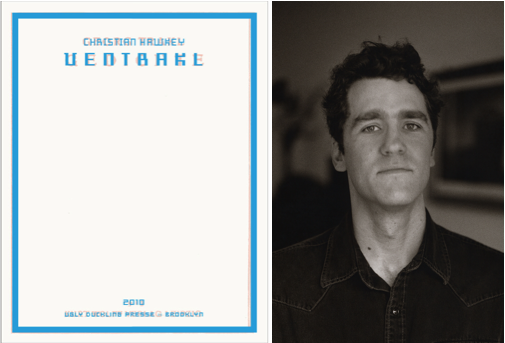Who is writing is the translator
A review of 'Ventrakl'

Ventrakl
Ventrakl
To quote Christian Hawkey’s quotation of Jean Laplanche:
The movement of auto-translation, the drive to translate (Trieb zur Übersetzung — to use Novalis's term) issues, springs up, not from the translator but from this untranslated or this imperfectly translated [text], which endlessly demands translation. (41)
Ventrakl is obsessed with the idea of translation (and its discontents). It interrupts itself so consistently with critical theory on the subject — not to mention archival photographs, imagined interviews, and poems — that you soon realize the book is entirely composed of interruptions.
For Hawkey, the act of translating from one language to the next has to be blatant. The poem is to be changed irrevocably if it is going to make it across the language barrier — not to mention the century gap between Trakl and his newest translator — with the same “spirit” intact. Though the final product looks completely different — the difference between a house and houseboat — Trakl’s still in it.
After all, any form of translation is inherently flawed, and the author celebrates that fact by filling his book with as many imperfect processes as possible: poems churned through an online translation engine; poems made of every line Trakl wrote that mentions the colors red or yellow ("Redtrakl," "Yellow Trakl"); and even poems made of what remained after leaving a book "outside to decompose over a full year in a glass jar filled with rainwater" (8). All these methods force the reader to trust the translator's premise that this is the poetry of Trakl, though you are provided with little proof. For example, "Reasons Why Orphans Wear Stillness-Mittens" does not directly correlate to any of the poet’s collections; instead it translates Trakl’s obsession with orphanhood:
1. It is difficult to think in the presence of an orphan.
2. It is difficult to think in the presence of the word "orphan."
3. It is like trying to think in the middle of an earthquake, trying to think about something other than what is happening, especially when what is happening is the repeated disturbance of the very ground of thought.
4. Some orphans become orphans, while others, despite being born, are born orphans, and still others are both born orphans and become orphans.
5. These orphaned orphans are the orphans with stillness-mittens (the ground is shaking). (96)
Like many poems in the book, “Reasons Why Orphans” elaborates on a theme from Trakl, rather than presenting one translation for one poem that he wrote. The last poem in Ventrakl, "Grodek," is the only occasion where the English translation appears side by side with the German original. It literally stops the book:
Die ungebornen Enkel.
is translated as:
The grandchildren — unborn. (148)
Here, the words match up quite neatly, but it’s Hawkey's differences — from/of/with the Austrian poet — that drive this book. And it's those same differences that put Ventrakl in conversation with all of Trakl's former English translators, who make an interesting bunch. That lineup includes (among others): Michael Hamburger, the great Celan translator immortalized in Sebald's Rings of Saturn; James Wright and Robert Bly, the dynamic duo of the Midwestern deep image; Robert Grenier, the father/uncle of the Language School poets beloved for his minimalist epic A Day at the Beach — all of whom appear in the 1983 volume Georg Trakl: A Profile, edited by Frank Graziano.[1]
A Profile begins with a question by Rainer Maria Rilke, writing on Georg Trakl: "What could he have been?" (Trakl, 7) — which is apt. What kind of figure could attract and marry the avant-garde tendencies of Grenier with the rural/lyric placidity of James Wright? Hawkey attempts to answer this question by marrying those two aesthetics himself. Poems like “Grodek” are paired with more bizarre translations, such as “Rosencrantz: A Western” or “You Bend My Megahertz,” whose titles alone address the range of permissible interpretation.
The nonstandard translation has its own traditions as Hawkey, in his introduction, points to the work of Jack Spicer, Louis Zukofsky, Anne Carson, and David Cameron, whose Flowers of Bad stands out as a particularly dedicated "bad translation" (Cameron's own phrase).[2] Cameron, for example, takes Baudelaire's poems and puts them through chance operations to create works that are the spawn of the great French poet, if translucently so. Hawkey puts Trakl through similar filters, though his methods don't reveal themselves immediately. The resulting language is more Hawkey’s than anyone else's.
In Ventrakl, he echoes Rilke's question:
The question of what?
Of who is speaking.
Who is writing then?
Who is.
Who is. (37)
Who is writing is the translator.
1. See W. G. Sebald, Rings of Saturn, trans. Michael Hulse (New York: New Directions, 1999); Robert Grenier, A Day at the Beach (New York: Roof Books, 1985); and George Trakl, Georg Trakl: A Profile, ed. Frank Graziano, trans. Robert Grenier, Michael Hamburger, David Luke, and Christopher Middleton (Durango, CO: Logbridge-Rhodes, 1983).
2. David Cameron, Flowers of Bad (Brooklyn: Ugly Duckling Presse, 2007).